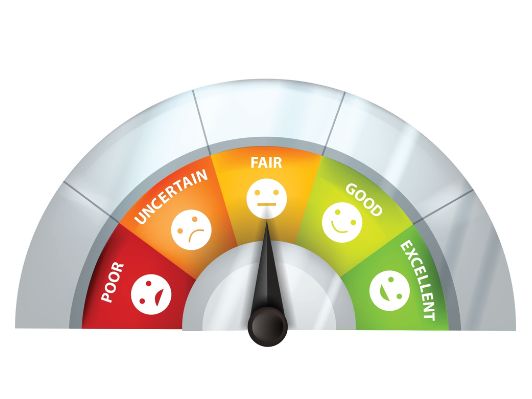Have you ever wondered how your credit score compares with everyone else’s in the UK? Knowing what the average credit score is can give you an idea of how well you’re doing with your own.
The problem is, getting one average credit score for the whole of the UK isn’t easy. That’s because we have three main credit reference agencies – Experian, Equifax, and TransUnion. Each of these agencies score people’s credit using different ranges. This makes it hard to get to one average score that fits across all three of them.
To break it down, we’ll look at the ranges these agencies use and get an average score for each of them. We’ll also look at how important your credit score is, what affects your credit score, and how you can improve credit score.
Table of Contents
How Do the Three Main Credit Reference Agencies Measure Your Credit Rating?
All three agencies – Experian, Equifax, and TransUnion – use different ranges to decide where your credit rating falls. From very poor or poor to excellent. We’ve got their ranges here so you can see the difference between them. We’ve also got their average credit scores for the UK.
Experian Credit Rating Scales
- Very Poor/Poor: 0-720
- Fair: 721-880
- Good: 881-960
- Excellent: 961-999
Average UK Credit Score: 759 (Fair)
Equifax Credit Rating Scales
- Very Poor/Poor: 0-438
- Fair: 439-530
- Good/Very Good: 531-810
- Excellent: 811-1,000
Average UK Credit Score: In 2021 Equifax changed their credit rating scales to this one above. We don’t have an average based on this new rating, but their old rating fell into the ‘Fair’ range.
TransUnion Credit Rating Scales
- Very Poor/Poor: 0-565
- Fair: 566-603
- Good: 604-627
- Excellent: 628-710
Average UK Credit Score: 610 (Fair)
As seen, the overall average credit score for all three credit reference agencies falls within the ‘fair’ range. But why does your credit score matter so much? Let’s find out.
How Important is Your Credit Score?
Credit scores are important as they’re a reflection of how good you are with money. Banks and lenders will do a hard credit check when you apply for a loan or credit card. They rely on this to give them an idea of how likely you are to repay them.
A hard credit check would be carried out for other reasons too, such as for mobile phone contracts and for renting a flat. This is why it’s important to look after your credit score. But what affects it and how can you improve your credit score? We’ll look at this next.
What Affects Your Credit Score and How Can You Improve it?
There are a number of things that could affect your credit score and bring it down. Here we give you the most common financial mistakes to avoid, with ways to help to build your credit rating.
1. Pay Your Debts on Time:
Whether it’s a short term loan, a credit card or some other kind of debt, making your repayments on time matters. If you miss your monthly payments, it’ll affect your credit rating.
Set up direct debits on your bank account so you don’t miss any repayments. Pick up some good budgeting tips to make sure you’ve got enough money to cover them. Paying your debts on time and in full will help build a good credit score.
2. Reduce Your Credit Card Debt
Lenders like to see that you’re not stretching yourself too much and are in control of your spending. If you’ve reached your credit limit on all your credit cards it can impact your credit rating.
Lenders prefer it if you’re borrowing no more than 30-40% of your overall credit limit, however the borrowing amount may differ from lender to lender. If you owe more than this, then find ways of bringing it down. This’ll help improve your credit score.
3. Join the Electoral Roll
Lenders need to verify that you are who you say you are. By being registered on the electoral role, it helps them do this.
If you’re not already registered on the electoral roll, then join it as it takes minutes to do. It’s a quick and easy way of giving your credit score a boost.
4. Check Your Details are Correct With all the Credit Reference Agencies
Not all lenders will use the same credit reference agency to do their hard credit check. That’s why you need to check whether your details are correct with all three of them.
Have a look at whether your name and address are correct on your credit files. Check that your loan and credit card repayments are being reported accurately. If you find any errors get them, put right, it’ll help improve your credit score.
In Summary
On average, people in the UK have a ‘fair’ credit score. That’s according to all three main credit reference agencies. By knowing what can have an affect on your own credit score, you can help to improve it. Building a good credit score is up to you. But as it can impact more than one area of your life, it’s worth doing what you can to keep your score high.
Disclaimer: We are not providing financial advice, these are just tips for informational purposes.

